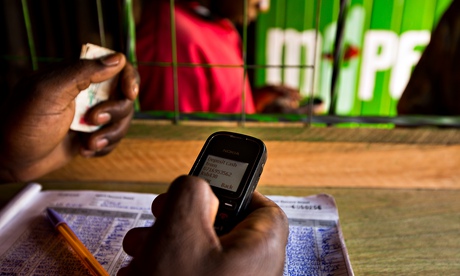
Kenya is a regional leader in access and use of financial services, with 77% of the population living within 5km of a commercial bank or mobile money agent, according to a recent report published by Kenya Financial Sector Deepening. Of the total number of financial access points, “mobile money agents represent 75%”, a statistic partly explained by the success of M-Pesa.
The pioneering mobile-based money transfer service, launched in Kenya in 2007 by telecomms company Safaricom, has become internationally renowned. Today 15 million subscribers use the service, transacting daily amounts estimated to be close to 60% of Kenya’s GDP. But competition is coming.
In April, the Communications Commission of Kenya licensed three new Mobile Virtual Network Operators (MVNOs). These operators allow companies to provide mobile money services without building new mobile infrastructure by working with existingmobile network operators. Equity Bank was one of the three to receive a licence while Safaricom’s competitor, Airtel Kenya, is to host the MVNO networks.
Not long after, Equity announced plans to issue subscribers with a thin sim card that sits on top of an existing card provided by other operators so customers can access its mobile money services without needing to own two phones.
The move clearly has business implications for Kenya’s mobile money market. Fortune Magazine predicted that “the apparent M-Pesa monopoly may be set to crumble”, indicating that the new licensing regime could open up the market long dominated by Safaricom. But will it widen financial inclusion in Kenya?
Perhaps predictably, Equity believes so, saying at the time of the launch that the MVNO would “make banking services more accessible, flexible, convenient and more affordable”. And others agree. In July financial inclusion organisation the Consultative Group to Assist the Poor (CGap) said that the move could lead to falling prices of financial services, more mobile money innovation, increased digital financial services uptake and better customer services.
However, the question remains as to whether the introduction of new MVNOs will speed up access for those still excluded from financial products and services?
There is clear evidence that Equity Bank is already playing an important role in deepening access to financial services in Kenya. By adopting the agency banking model, consumers can access an Equity agent in a coffee shop, supermarket or corner shop. The bank has indicated that it will more than halve interest rate charges (“… instant loans will be available at a maximum of 2% per month compared with the 7.5% per month offered in the market”), which could facilitate micro-lending. Finally, Equity has announced extremely low transaction costs for money transfers – between Kshs1 ($0.01) and Kshs100 ($0.28).
In response, Safaricom slashed transaction charges by 65%, but this increased competition is not all good news. CGap has expressed concerns that the ensuing price wars could create “confusion as customers try to navigate a wide array of products with different features, pricing models, and standards of service”.
This is not the only challenge. Last month, the Kenyan courts become involved as Safaricom sought to review its legal commitment to customers that opt to use Equity’s thin sim, saying that the product could be expose subscribers to financial fraud. There are also questions about the quality of service that will be provided by the MVNOs, as well as the regulatory environment.
For observers of Africa’s banking sector, these are interesting times. Despite the challenges, particularly for regulators, there is little doubt that the problems of access for the poorest are now firmly in the sights of industry leaders.
Equity’s chief executive, James Mwangi underlined the value of Equity’s new mobile banking service, saying: “The biggest problem with accessing a bank is not bank charges, it is the cost of access. I will have to go 70km to where the bank is; I will have to pay public transport; I will have to spend the whole day to get to the bank.
“If we really want the masses and low-income people to join banking, then we should make financial products very affordable, and that is the value proposition that we are making to the market.”
Read more stories like this:
• Taking financial services to Africa’s poorest consumers
• Cashing in: why mobile banking is good for people and profit
• Is India’s new financial inclusion strategy already outdated?
• Advertisement feature: Infographic: mobile money solutions for Ghana
Join our community of development professionals and humanitarians. Follow @GuardianGDP on Twitter.

